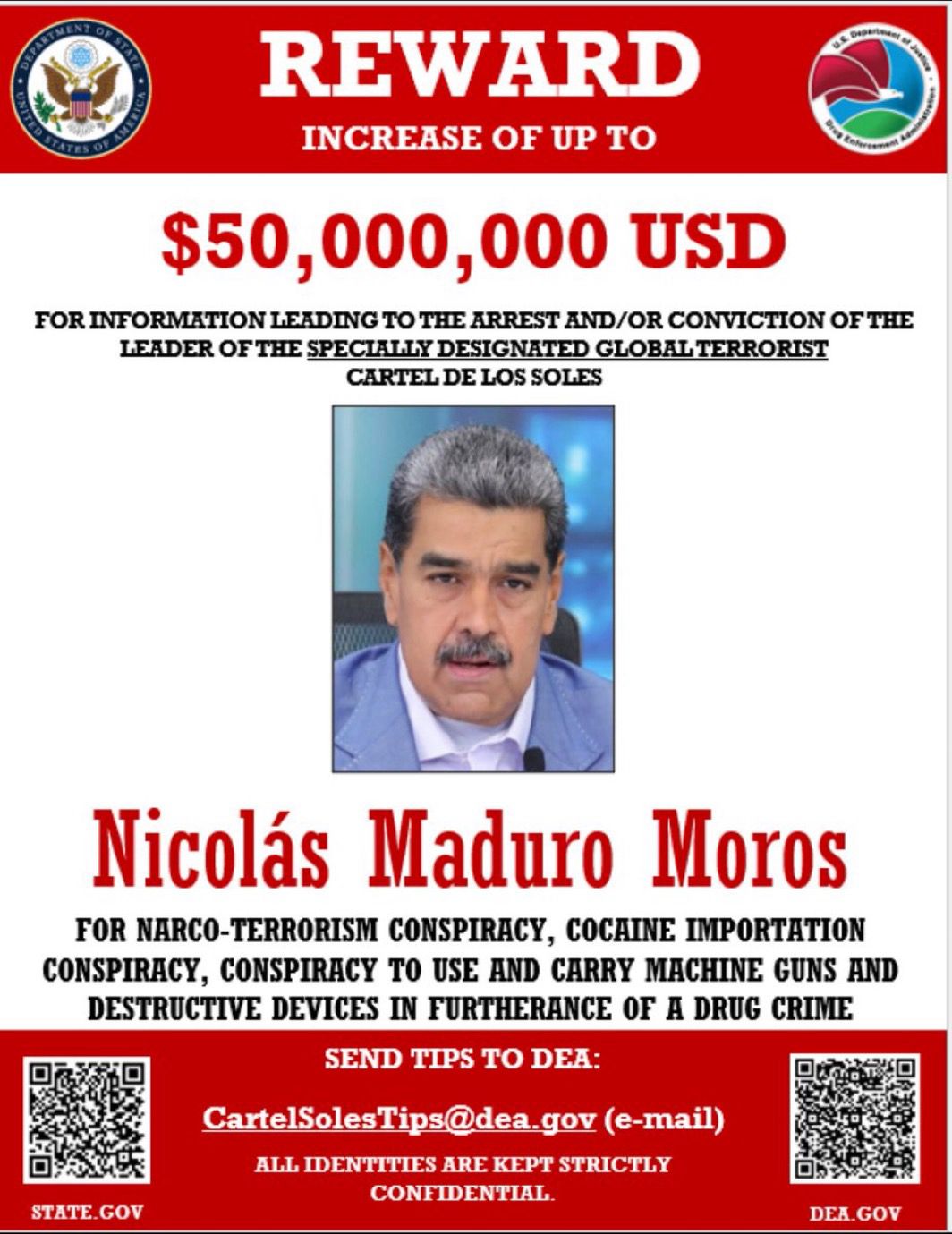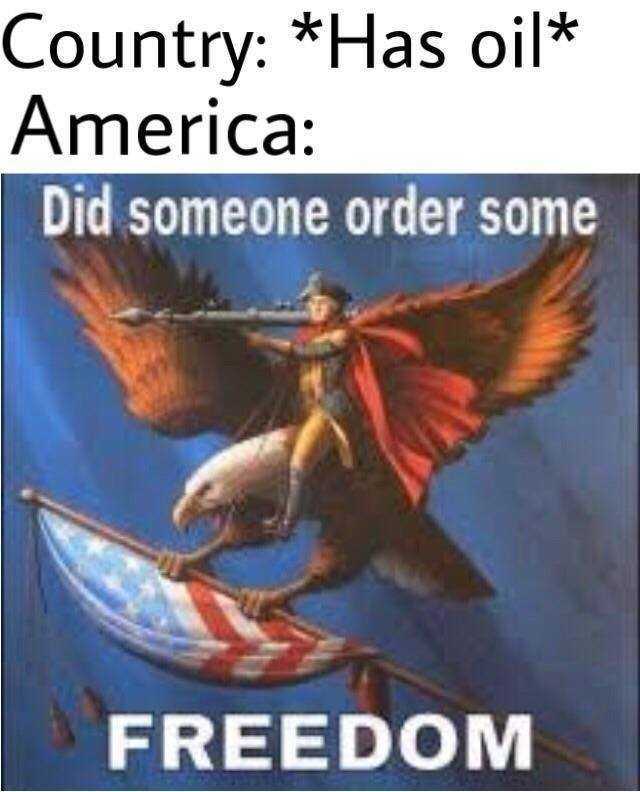The U.S. has never been closer to armed conflict with Venezuela, with a fully loaded U.S. flotilla sitting off its coast and dictator Nicolás Maduro living under a $50 million bounty.
The intrigue: Even close Trump advisers aren't entirely sure whether the gunboat diplomacy is a drug trafficking operation with undertones of regime change, or a Caracas coup operation masquerading as drug enforcement.
Driving the news: President Trump ordered seven warships carrying 4,500 personnel — including three guided-missile destroyers and at least one attack submarine — to the waters off Venezuela.
Officially, they're there to combat drug trafficking. But Press Secretary Karoline Leavitt leaned into the ambiguity of the mission on Thursday, noting that the U.S. considers Maduro the "fugitive head of [a] drug cartel" and not Venezuela's legitimate president.
What they're saying: "This is 105% about narco-terrorism, but if Maduro winds up no longer in power, no one will be crying," said one Trump administration official familiar with the policy discussions.
Another administration official had a different view. "This could be Noriega part 2," the official said, referring to the U.S. military's 1989 operation to capture Panamanian President Manuel Noriega, who — like Maduro — faced U.S. drug-trafficking charges.
"The president has asked for a menu of options. And ultimately, this is the president's decision about what to do next, but Maduro should be s***ting bricks," the official said.
A third Trump adviser put it this way: "Leaving Maduro in power in Venezuela is like making Jeffrey Epstein the head of a daycare."
State of play: While administration officials have refused to rule out an invasion, nearly all privately believe it unlikely.
However, Trump's deployment does include 2,200 Marines, the boots-on-the-beach branch of the military. That's hardly typical in drug enforcement.
The $50 million bounty on Maduro's head was announced on Aug. 7 — one day before Trump ordered the military to go after drug cartels in Latin America.
Flashback: Maduro was first indicted during Trump's first term as leader of a drug gang called Cartel de los Soles, which Treasury designated a foreign terror group last month. A superseding indictment could drop soon.
The other side: "What they're threatening to do against Venezuela — regime change, a military terrorist attack — is immoral, criminal and illegal," Maduro said Friday, before he called on citizens to join a militia to fight off an anticipated U.S. invasion.
Maduro's fellow leftist ally, Colombian President Gustavo Petro, said Monday on X that "the Cartel of the Suns does not exist; it is the fictitious excuse of the extreme right to overthrow governments that do not obey them."
Petro on Thursday amplified a Russian media report accusing the U.S. of wanting to take Venezuela's oil, and announced he was beefing up his military's presence along a portion of the border Colombia shares with Venezuela.
Zoom in: Oil is the other major factor in U.S. relations with Venezuela, which has the world's largest proven reserves.
Just before labeling Maduro a terrorist, Trump reduced some pressure by allowing an oil-pumping deal between Venezuela and Chevron to resume.
Trump made early entreaties to Maduro with oil in mind, via special envoy Ric Grenell. But he also appointed an anti-Maduro hardliner, Marco Rubio, as secretary of state and national security adviser.
"You can only imagine how bewildered Latin Americans are watching this drama unfold," Michael Shifter, a Georgetown professor and expert on the region told Axios.
Between the lines: Trump's policy today is driven largely by Rubio, a bilingual son of Miami's staunchly anti-socialist Cuban exile community.
In Rubio's worldview, Maduro's regime is propped up by Cuban intelligence, while Venezuela supports the Cuban economy with cheap oil.
"This is just the first phase of cleaning up the hemisphere. Latin America has been playing second fiddle in foreign policy until now," said Arthur Estopinan, who served as chief of staff to an early Rubio mentor, Rep. Ileana Ros-Lehtinen.
What's next: The prevailing administration hope is that Maduro negotiates an exit or is assassinated by members of the military anxious to collect the bounty or normalize ties with the U.S.
While an actual invasion force is hard for many to envision, officials see aggressive interdictions of suspected drug-running boats off Venezuela as all but certain. Said one official: "Some boats will definitely be caught or sunk."
Airstrikes are also a possibility. Sources speculated that targets could include sparsely populated jungle areas where cocaine production or cartel activity is suspected, or a new Russian-built ammunition plant.
Some in Trump's orbit even think Maduro could be targeted in a drone strike, given he is officially a terror suspect. Officials who spoke to Axios downplayed that possibility.
Friction point: Trump showed in Iran that he's willing to employ sudden, decisive force, but some of his American First allies see decapitating the regime in Caracas as dangerous boondoggle.
Officials acknowledge some of their beliefs about whether Maduro might flee or who would succeed him are highly speculative. After all, Trump tried for regime change in Caracas in his first term, and failed.
One U.S. official said the assumption is there's little real loyalty to Maduro inside the regime, except where he can buy it. "Where he goes, I don't think we much care. There are others in Venezuela that are equipped to run a country as well or better than he did. We're not picking any favorites."
"He might be stuck because the Cubans around him won't let him leave," said another Trump adviser. "So he might just leave in a body bag."








